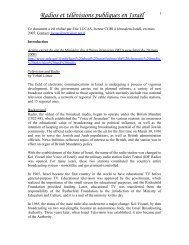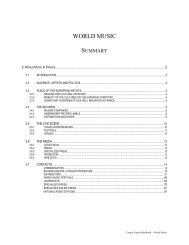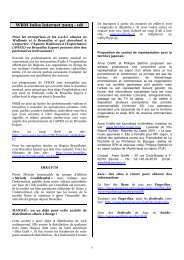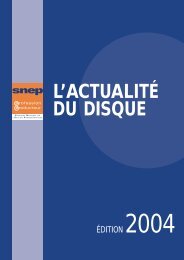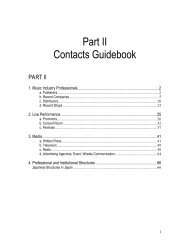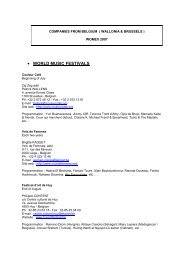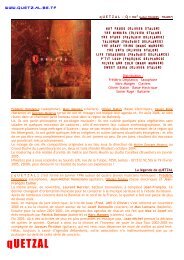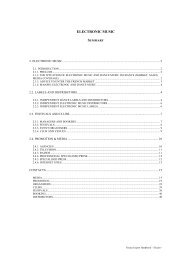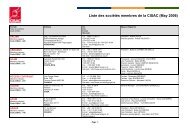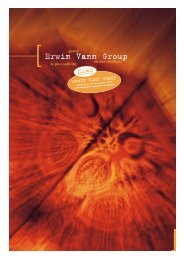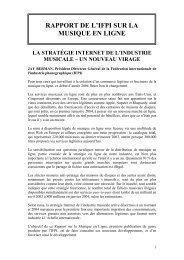Create successful ePaper yourself
Turn your PDF publications into a flip-book with our unique Google optimized e-Paper software.
MONETISING MUSIC IN AN ERA OF FREE - THE ROLE OF ISPs AND GOVERNMENTSSimilar initiatives are being taken elsewhere.In December 2008 the US recordingindustry announced it is working with theAttorney General of New York and leadingISPs on a series of voluntary online antipiracyinitiatives, with Attorney GeneralAndrew Cuomo urging a deal involvinga graduated response approach. In aseparate but parallel move, the RIAA andseveral leading ISPs agreed on principlesunder which ISPs will take responsibility tosend notices and institute a programmeof escalating sanctions for subscriberswho are repeat copyright infringers.In February 2009 New Zealand will startoperating a graduated response systemfollowing enactment of a law in April 2008requiring ISPs to adopt and reasonablyimplement a policy of terminating theaccounts of repeat infringers.In Australia the Minister for Broadband,communications and the digital economy,Stephen Conroy, interviewed on nationaltelevision, said illegal file-sharing has“decimated the music industry” and woulddo the same to film and other sectors unlessthere are “significant changes”. He added:“The so-called three strikes legislation hasbeen talked about in Australia and we’rewatching closely what’s happening inFrance and the UK and we’re consideringwhat we can do to support intellectualproperty rights. People will change theirbehaviour if there’s an economic cost.”“When I exceed the speed limit on theroads too many times, I know I will losemy licence for six months and I accept thatas normal. There’s no reason for a changeof attitude when it comes to the internet.As human beings we don’t like rules andregulations, but we don’t live in an idealworld and a free-for-all benefits nobody.”Chris Ancliff,General Counsel, EMIThe momentum in favour of ISP cooperationhas reached Asia as well. In April 2008 inJapan, a consortium of ISP, music andfilm trade associations was established toagree measures against copyright abuse onJapan’s chief ISP network. The national policeand senior government representatives areobservers on the consortium. ISP actions tonotify infringers and terminate the accounts ofrepeat offenders are on the agenda. The HongKong government launched a discussionforum between content industries and ISPs in2008 and has said it is prepared to legislateif necessary. In South Korea the governmenthas issued for consultation a draft lawintroducing a system of graduated sanctionsagainst online infringement, includingterminating the accounts of repeat offenders.Meanwhile, courts in different countries havehelped clarify the existing legal obligationsfor ISPs to help fight piracy. In a landmarkjudgment in 2007, a court in Belgium orderedthe ISP Scarlet (formerly Tiscali) to make itimpossible for its users to infringe copyrightusing peer-to-peer protocols on its networks.The court found filtering to be a feasible andappropriate means to distinguish betweenlegitimate and unauthorised files. In October2008, a further court ruling rejected the ISP’sclaims that filtering was impossible. The courtsaid it was “not unreasonable to require of SAScarlet that it make greater efforts than thosewhich it had shown thus far” to stop copyrightinfringement. The ISP has been liable forfines of €2,500 every day from 1st November2008 until it takes effective steps to curb itsusers’ infringement of Belgian copyright law.Courts have also confirmed the need forISPs to block access to copyright-infringingwebsites. In November 2008, an appeal courtin Denmark upheld a decision requiring an ISPto block access to The Pirate Bay website.Courts have also ruled that the suspensionof internet accounts being used illegally isacceptable under EU law. In Finland, a courtordered TeliaSonera, a leading ISP, to suspendthe internet connection of a customerwhose connection was used to upload aconsiderable number of infringing music files.New law ‘will sustainFrench creative industry’.PresidentSarkozy’s groundbreakingproposalfor legislationin France owesmuch to theleading economistOlivier Bomsel, who says its keyobjective is “to sustain a contentindustry in France in the future.”Bomsel sees the graduated responseas important to the next developmentphase of the creative internet economy.In phase one, during the rapid expansionof broadband networks, ISPs used freecontent to boost the roll-out of theirfast-growing new businesses. In this firstphase “content” took second place tothe perceived benefits of the broadbandrevolution. “The consequences werea free ride for distributors, while the ITindustry successfully argued that theadvantages of network rollout offset thelosses to the content industry,” saysBomsel. As a result, consumers wereprepared to pay for new equipmentand network access while contentwas made available largely via massiveintellectual property infringement.The new French law, says Bomsel,aims at a fair solution for the nextphase of the internet revolution.In phase two, once the rollout ofbroadband is over, the ISPs have tobecome fair distributors. A graduatedresponse system will be introduced bywhich the repeat infringer would facesuspension of internet access after twowarnings. A government-appointedindependent watchdog supervisesthe system and relays the warningsvia the ISP. Bomsel says the elementof sanction in this system is essential:“The system depends on the reliabilityand deterrence of the sanction.”25



